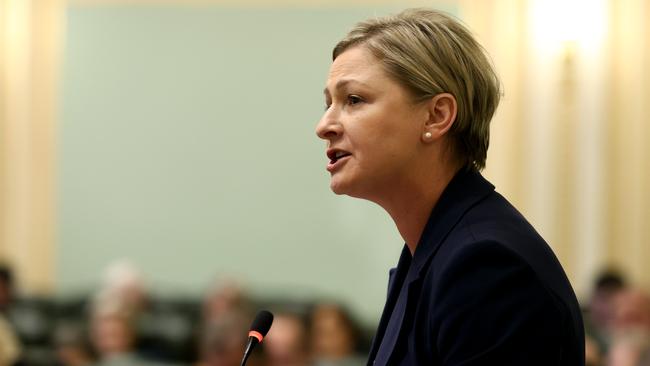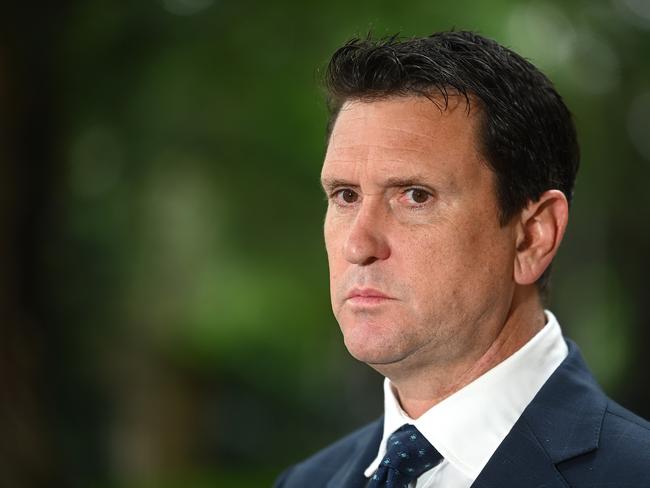DV Qld: New police protection direction to help victims
Domestic violence victims will get instant protection and hundreds of thousands of man hours will be saved by police under a new mechanism.

QLD Politics
Don't miss out on the headlines from QLD Politics. Followed categories will be added to My News.
Police will be able to issue instant protections for domestic violence victims without going to court, under major reforms aimed at holding offenders to account.
The change would see perpetrators issued a special 12-month police protection direction to keep victims safe, and save police hundreds of thousands of hours by cutting through the current onerous processes, allowing them to attend more jobs.
The significant reform comes after Police Commissioner Steve Gollschewski and Queensland Police Union boss Shane Prior revealed the service was unable to keep up with skyrocketing demand, leaving hundreds of domestic and family violence calls for help unanswered.
Prevention of Domestic and Family Violence Minister Amanda Camm was expected to reveal the first tranche of proposed reforms on Friday, vowing to bring down victim numbers.
“It’s my intention that through greater perpetrator accountability, we want to see numbers start to decline, but we can’t even start to foresee that if police don’t have the basic resources that they need,” she said.
“I’m one of the ministers responsible for … victim numbers falling for domestic and family violence, and I’ll be accountable to the Premier who’s accountable to Queensland.”
The Queensland Police Service has experienced a 20 per cent rise in domestic and family violence demand, receiving more than 200,000 DFV calls for help annually.
Currently, officers can place temporary orders on offenders which require victims to attend court to pursue protections.
Police Minister Dan Purdie said with response times ranging between four and six hours, PPDs would save the service “hundreds of thousands of hours”.
“We can’t sit back,” he said.
“We need to get to the point where the police can respond to calls for service for vulnerable people.
“If police were able to just issue a direction on the spot, not having to go through all the affidavits, go through the service, or issuing documents that they have to do now, that is going to save hundreds of thousands of hours … so they can get to that next call.”
In a message to members, Queensland Police Union president Shane Prior said the police protection directions had been proposed by the union.
He said it would be a “significant turning point” in the way police responded to DV.
The union had proposed the reform in a DV Blueprint and the police service had also proposed a similar strategy.
“Make no mistake, these landmark announcements would not have occurred had your union not led from the front to highlight the crippling burden of DFV processes on the frontline and its broader impact on proactive policing, recruitment and historically high attrition rates,” Mr Prior wrote.
“We’re grateful to the Queensland Government, particularly Minister Amanda Camm and our Police Minister Dan Purdie, for acting on key elements of our blueprint, and we look forward to ongoing collaboration to deliver further results for our members.”
Police Minister Dan Purdie said the government had been listening to frontline police.
“We’ve been listening to the Queensland Police Union, particularly Shane Prior, who’s been leading a campaign on this, and we’re embarking on this overdue reform,” he said.
Opposition frontbencher Grace Grace said reform to help police and domestic violence victims was needed, but “the devil is in the detail” in whether Labor would support the legislation.
She said evidence and proper consultation from experts had to justify that these reforms would make a difference.
“We’ll want to see the detail in relation to that,” Ms Grace said.
Reforms will also include expanding video recorded evidence trials and the LNP’s election commitment to issue hundreds of GPS ankle monitors to the worst DFV offenders.
While the first tranche of reforms will not include a “commit domestic violence” offence, Ms Camm said she was open to further legislative changes.
“I’ve met with Shane Prior, the Police Minister and I have done this together, and we both agree it’s (DFV offence) complex,” she said.
“Coercive control is coming into law next month, we’ll be seeing how that legislation is actually used.
“While we are committed to further reform, I’m open to anything that can … combat domestic and family violence across our community.”
The introduction of PPDs will not change police processes when responding to domestic violence.
Similar to police protection notices, conditions can be attached to PDDs including cooldown, outster, return or no contact provisions to protect victims.
If a respondent continues to commit offences against the aggrieved or named person within the 12 months, police can take further action.
The first tranche of domestic and family violence reforms will also see the rollout of the government’s GPS monitoring program for the state’s worst offenders.
Announcing the measures on Friday morning, Ms Camm said “we need to do something differently” by putting more emphasis on offenders’ accountability, rather than on the victim.
She said reforms in the domestic violence act will ensure GPS monitoring devices could be fitted to perpetrators by the end of the year.

The Minister said the legislation could speed up the protection for victims by days, by bypassing the court system.
“We need to respond to the scourge of domestic and family violence, it is growing at a rate that is out of control,” Ms Camm said.
“It is not just a woman’s problem, it is not just a victim’s problem, this is a whole of community effort and we need to focus on perpetrator accountability if we’re ever going to make a dip in those numbers.”
Police Minister Dan Purdie said there will be “safeguards” in the legislation ensuring the right people were being protected, and that these would need to be authorised by senior officers.
But there would be times when it would be required for the court system to still issue PPDs.
He said “policing has been crumbling” under increased workload pressure and that reduced paperwork would alleviate it.
“The police have done a lot of training in that, and they’ve done a lot of domestic violence calls for service … 200,000 calls for service and putting almost 60,000 applications before the court,” Mr Purdie said.




